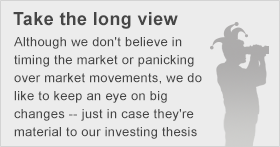
On Monday, investors originally went into a near-panic following the release of troubling economic data from China indicating an unexpected plunge in exports. Yet over the course of the day, the market clawed back all but a small fraction of its losses, with the S&P 500 closing down just 0.05% on the day. The best performing stocks in the market included Chiquita Brands International (NYSE: CQB), McClatchy (MNI +0.00%), and Intercept Pharmaceuticals (ICPT +0.00%), which climbed for a variety of different reasons today.
Chiquita Brands jumped 11% after the banana giant agreed to merge with Irish produce giant Fyffes to create what will become the largest banana producer in the world. If approved, the merger of near-equals will leave current Chiquita shareholders owning just under 51% of the combined ChiquitaFyffes, and the companies expect to save $40 million per year from the combination. The deal will be bad news for privately held Dole Food, which would lose its No. 1 status in the banana market if the merger goes through, but given that Fyffes shares soared 42% on the London Stock Exchange, it's clear that shareholders of both companies are pleased with the deal. The transaction also effectively transfers Charlotte-based Chiquita's domicile to Ireland, with attendant benefits that have led many other U.S. companies to go across the Atlantic.
McClatchy rose 14% on reports that it and other companies that co-own the Cars.com website are looking to sell the e-commerce site, hoping to get $3 billion for the business. Gannett (GCI +0.00%) and several other newspaper companies own Cars.com through a joint venture, and Gannett rose 2% today. But McClatchy has a much smaller market capitalization than Gannett, and so a prospective deal -- and the money that would come from it -- would make a much bigger difference to its shareholders.
Intercept gained 8%. Despite a lack of specific news affecting the promising biotech, investors continue to watch closely for signs of the potential of Intercept's obeticholic-acid therapy for primary biliary cirrhosis and non-alcoholic steatohepatitis. With analysts suggesting annual sales of $3 billion are possible even if a successful drug only gets used in a limited subset of NASH cases, Intercept has plenty of potential. But nervous investors have also pointed to the huge rise in biotech stocks more generally as being a troubling sign of what could prove to be a short-lived trip to the stock market stratosphere if things don't go perfectly for Intercept.